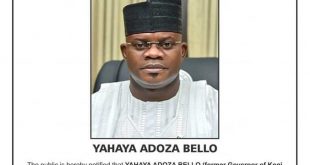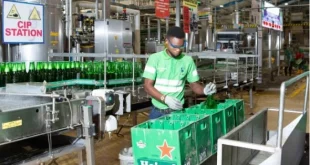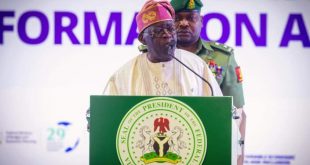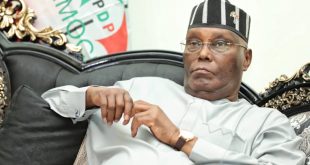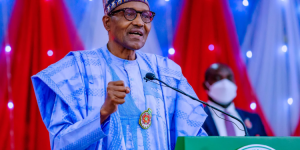
Mr Buhari said the COVID-19 pandemic, the war in Ukraine and the loss of substantial volumes of oil have had negative impacts on the Nigerian economy.
President Muhammadu Buhari says despite the disruptions in global economy and internal troubles, the Nigerian economy has continued to be resilient and maintain an upward trajectory.
The president stated this at the inauguration of the Presidential Committee on the National Economy, on Friday in Abuja.
According to him, the COVID-19 pandemic, the war in Ukraine and the loss of substantial volumes of oil have had negative impacts on the Nigerian economy.
He said: “Starting with COVID-19 and now the conflict in Ukraine, the past three years have been turbulent ones for the global economy. Global interdependence has become more apparent as we have had to deal with volatility, uncertainty, complexity and ambiguity.
“In this period, challenges faced by the world have been many including: lockdowns as COVID-19 raged; disruptions to supply chains around the world, and sharp fluctuations in prices.
“Just as the world was beginning to recover from the coronavirus, the conflict in the Black Sea region between Ukraine and Russia worsened the challenges already being faced and created additional problems to which policy makers are having to respond.
“Our economy continues to grow despite the adverse effects of rising interest rates, a stronger US dollar and higher inflation across the world.”
Mr Buhari noted, however, that some of the problems could be addressed internally, making the constitution of the seasoned economic experts expedient.
“It is, however, important to note that some of the issues we must address are peculiar to us.
“For example, the decline in our production of crude oil. It is estimated that last month, August 2022, we produced less than 1mn barrels. The fall in production is essentially due to economic sabotage.
“With the high price of oil in the world markets, producing at about half our OPEC quota has deprived us of much needed revenue and foreign exchange. Government is working tirelessly to reverse this situation,” Mr Buhari said.
He, however, assured Nigerians that despite these hiccups, necessitating borrowings from financial sources, “the current administration remains committed to the welfare of the citizens, especially the implementation of the Social Investment Programmes.
“While citizens’ concern about borrowing is well understood, our resort to borrowing must also be appreciated in the context of the resources required to deliver on the infrastructure, health and other socio-economic needs of our citizens.
“It remains a major goal of this administration to continue pursuing its social protection programmes.
“These programmes provide support to the most vulnerable of our citizens.”
The Nigerian leader stressed the need to upscale resource mobilisation and utilisation in the country as more could be achieved in this direction.
According to him, his administration is also not unaware of the debates about resource mobilisation and utilisation.
“On resource mobilisation, our performance as a nation continues to be a source of concern.
“Tax revenues are approximately 8 per cent of our output. This compares very badly with those countries against which we measure ourselves that achieve 15-25 per cent.
“In the absence of revenue, our ability to deliver the most basic services is limited,” he added.
Fuel subsidy
According to the president, while he understands the concerns arising from the huge expenditure on fuel subsidy, it is expedient that a right balance be struck not to scare away investors.
He said: “With respect to expenditure, our objective remains to ensure that spending is efficient and result oriented. In this regard, the debate around fuel subsidies is well noted.
“However, the right balance needs to be struck to ensure that as we protect our citizens, we do not leave room for inefficiencies and leakages.
“It is also important to ensure that our national investment environment is such that local and international private investors can be attracted and retained.
“Sustainably dealing with the challenge of policy predictability and coherence is an important element in this regard.”
Mandate
On the mandate and constitution of the Committee under his headship with representations from state governors, the president said he was convinced that it would deliver as expected for the benefit of the populace.
“The Presidential Committee of the National Economy, which I am inaugurating today, aims to bring together all policy makers responsible for the economy.
“In this way, we share a common understanding and approach to resolving the issues I have identified and many more.
“This Committee will provide our nation an opportunity to be bold, more proactive, and innovative in tackling persistent challenges.
“The work with which I have tasked the assembled team will enable us respond more swiftly and efficiently,” the president said.
Presentations were made at the event by Doyin Salami, Chief Economic Adviser to the President; Zainab Ahmed, Minister of Finance, Budget and National Planning, Niyi Adebayo, Minister of Industry, Trade and Investment, as well as Godwin Emefiele, Governor, Central Bank of Nigeria.
Governor of Sokoto State, Aminu Tambuwal, represented Chairman of the Governors Forum.
The Presidential Committee on the Economy is chaired by Mr Buhari and has as members the Vice President, Yemi Osinbajo; Kayode Fayemi, Chairman of the Nigeria Governors Forum; Timipre Sylva, Minister of State for Petroleum, Mrs Ahmed and Mr Adebayo.
Other members iare Boss Mustapha, Secretary to the Government of the Federation; Ibrahim Gambari, Chief of Staff to the President; Mohammed Sagagi, Vice Chairman of the Presidential Economic Advisory Council; Mr Emefiele and Mr Salami, who is the secretary of the committee.
The committee will review the national economic situation and propose measures to ensure the national economy improves and can meet the government’s objectives.
The committee will also receive regular updates on economic conditions in the country, identify issues that require urgent intervention to improve macroeconomic and fiscal conditions, review the impact of existing and new policies on the Nigerian economy.
It also provides directions to relevant institutions responsible for fiscal, monetary, and any other relevant policies.
Officials say against the backdrop of recent developments in the global economy and its impact on Nigeria’s economic trajectory, this presidential committee is another clear demonstration of “the president’s total commitment to ensuring that the Nigerian economy successfully navigates through these difficult times”.
It will be an “economic emergency room” that will work towards keeping Nigeria on the path of economic recovery and growth, global competitiveness as well as inclusive development and sustainability.
(NAN)
 DailyrecordNg …Nigeria's hottest news blog
DailyrecordNg …Nigeria's hottest news blog



